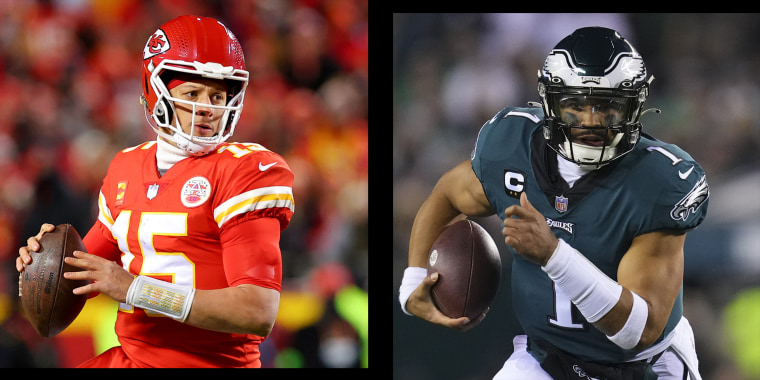In what is catnip to the National Football League's PR department, Sunday's Super Bowl in Glendale, Arizona, will feature two Black starting quarterbacks: Jalen Hurts for the Philadelphia Eagles and Patrick Mahomes for the Kansas City Chiefs. Not surprisingly, the NFL is attempting to hold itself up as an agent of racial progress. Even though the NFL is correct to trumpet this history-making moment as a big deal, in wrenching their arms to pat themselves on the back, the league's executives haven't done enough to acknowledge what it really says about the league that it turned 100 years old years before reaching this milestone.
Only seven Black men have ever played starting quarterback in a Super Bowl. That number includes Mahomes. Hurts will become the eighth.
This is another moment that exposes harsh realities about the NFL. Not only is this only the first time two Black quarterbacks have squared off in the big game, but there's also this: Only seven Black men have ever played starting quarterback in a Super Bowl. That number includes Mahomes, who led the Chiefs to victory in 2020 and lost in the big game the next year. When Hurts steps onto the field tonight, he will become the eighth.
“Not only do we get to watch two great quarterbacks, but if done right, we will get a great conversation and lesson about race in America,” Grand Valley State University Professor Louis Moore, author of "We Will Win the Day: The Civil Rights Movement, the Black Athlete, and the Quest for Equality," told me last week. Moore is now writing a book about the history of Black quarterbacks. "Of course, there will be superficial stuff about progress and how far we have come. But I’m really interested in the history and why it took so long to get to this point. Because the ‘why it took so long’ matters.
"This is a story of how race operates in America," Moore said. "Stereotypes about leadership and intelligence. It matters, especially if we tell that part. Football is America’s game, and in America’s game, for far too long, a nasty stereotype has been used to deny men a chance to compete. This Super Bowl should be transformational, but that stereotype is hard to defeat.”
Despite Moore’s desire for a conversation “done right,” a conversation that addresses why it has taken so long to get to this point, NFL Commissioner Roger Goodell barely touched the issue at his annual State of the League press conference Wednesday. Although Goodell acknowledged that “there are probably a variety of reasons, probably none of them good,” for why it has taken so long to see two Black quarterbacks square off in the league’s championship game, he quickly pivoted to the corporate friendly language. “I just think it’s another example of where diversity makes you better,” he said.
It’s a shame none of the reporters in the media scrum challenged Goodell to elaborate on what he believes those “variety of reasons” are and ask him to what extent those reasons are still holding back Black people in the NFL. Goodell was not asked about coach Brian Flores’ ongoing racial discrimination lawsuit, in which Flores, who says he and other Black coaches have been discriminated against, compares the NFL to a plantation. He was not pressed about former Carolina Panthers interim head coach Steve Wilts, a Black coach who is a part of Flores’ lawsuit, being let go after a brilliant run turning around the woebegone Panthers.
Goodell has an obligation to explain the continued blackballing of Colin Kaepernick — yes, even now.
Goodell also has an obligation to explain the continued blackballing of Colin Kaepernick — yes, even now — and to explain how the league could feel so good about itself and celebrate its supposed progress when the man who was only the fourth Black starting quarterback to play in the Super Bowl was turned into a pariah for using his NFL platform to speak out against racial inequity and police brutality. He was cast out for raising his voice against the kind of violence that just claimed Nichols’ life. This is the very violence the NFL — or at least its branded slogans — claim to oppose.
This Super Bowl matchup is a tribute to the hard work and dedication of two quarterbacks who were described with the same racist stereotypes that Moore is detailing in his book. It is a credit to each team’s management that they ignored the criticism of Hurts being just a “running quarterback” or Mahomes being “poor mechanically.” But please don’t say the ascension of Hurts and Mahomes is a sign of league progress. It’s more a sign of athletes who have broken down doors in the face of deeply held prejudices. That is what we should celebrate.

